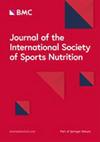在身体活跃的个体水合实践的文化差异:叙述回顾
IF 4.5
2区 医学
Q1 NUTRITION & DIETETICS
Journal of the International Society of Sports Nutrition
Pub Date : 2022-04-04
DOI:10.1080/15502783.2022.2057196
引用次数: 3
摘要
摘要:众所周知,适当的水合作用是促进健康和优化性能和恢复的必要条件。然而,由于各国之间的文化差异,如宗教信仰、传统、偏好和饮料供应,可能无法采用基于证据的补水指南。受文化影响的补水习惯包括西方国家运动后喝啤酒、印度喝甘蔗汁以及穆斯林斋月禁食。对于大多数补水习惯,科学证据表明补水对补水、运动表现和恢复的影响有限。尽管各种补水练习对运动表现和恢复可能有好处,但它们与目前基于证据的补水建议不一致。有必要对文化水合差异对生理、表现和恢复的影响进行更多的研究,以提供基于证据的指导和建议。缩写词:ABV:酒精体积,ACSM:美国运动医学学院,NATA:国家运动教练协会,ROS:活性氧,TCM:传统中医本文章由计算机程序翻译,如有差异,请以英文原文为准。
Cultural differences in hydration practices among physically active individuals: a narrative review
ABSTRACT It is well-established that appropriate hydration practices are essential in promoting health and optimizing performance and recovery. However, evidence-based hydration guidelines may not be adopted due to cultural differences across countries, such as religious beliefs, traditions, preferences, and beverage availability. Examples of hydration practices influenced by culture include beer consumption after sports in Western countries, consumption of sugarcane juice in India and Ramadan fasting among Muslims. For most cultural hydration practices, there is limited scientific evidence on their effects on rehydration, exercise performance, and recovery. Despite possible benefits of various hydration practices on exercise performance and recovery, they are inconsistent with current evidence-based hydration recommendations. More research on the impacts of cultural hydration differences on physiology, performance, and recovery is warranted to allow evidence-based guidelines and advisories. Abbreviations: ABV: alcohol by volume, ACSM: American College of Sports Medicine, NATA: National Athletic Trainers’ Association, ROS: reactive oxygen species, TCM: Traditional Chinese Medicine
求助全文
通过发布文献求助,成功后即可免费获取论文全文。
去求助
来源期刊

Journal of the International Society of Sports Nutrition
NUTRITION & DIETETICS-SPORT SCIENCES
CiteScore
8.80
自引率
3.90%
发文量
34
审稿时长
6-12 weeks
期刊介绍:
Journal of the International Society of Sports Nutrition (JISSN) focuses on the acute and chronic effects of sports nutrition and supplementation strategies on body composition, physical performance and metabolism. JISSN is aimed at researchers and sport enthusiasts focused on delivering knowledge on exercise and nutrition on health, disease, rehabilitation, training, and performance. The journal provides a platform on which readers can determine nutritional strategies that may enhance exercise and/or training adaptations leading to improved health and performance.
 求助内容:
求助内容: 应助结果提醒方式:
应助结果提醒方式:


